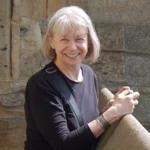The Value of Knowing What You Don’t Know

Last night after class, I asked a student how her home practice was going. A few weeks earlier, we’d met privately to work out a routine that was specific to her: something short and simple that would address the tight shoulders, hips, and hamstrings that were restricting her in the poses. It turned out she wasn’t all that happy.
I’d suggested rolling on massage balls as the most direct and pleasant route to releasing the tension in her shoulders. They were working just fine. But something wasn’t right with the standing poses. “I wish they felt more natural,” she said. “I feel like I don’t know what I’m doing. I keep wondering: am I supposed to move my hips in Triangle Pose [Trikonasana] in this way?” as she gave her pelvis an exaggerated, exasperated swing to the left.
I understood her frustration, but I couldn’t have been more pleased. This student had made a transition. Alone, at home, grappling with the subtle mysteries of Triangle Pose, she had discovered, in detail, something she didn’t know. In the language of the four stages of competence theory, she had moved from unconscious incompetence to conscious incompetence. That may not sound like much, but it’s one of the most important signs that someone is on the path to a personal yoga practice and not just wandering the woods.

Questioning is the Essence of Yoga Practice
To ask a question of a pose when you’re alone with it might in fact be the essence of personal practice. Yes, it’s a long trip from frustration over not knowing how the hips move in a standing pose to arriving at the destination: a laser focus in every pose. But those two states share a genuine awareness that you don’t know it all, and there’s something, in particular, you’d like to know.

(Don’t drop that question mark. It might be your most valuable yoga prop.)
The second stage of competence theory, conscious incompetence, is scratchy, especially at the beginning. When you first turn inward and pay attention, you mostly run up against your limitations. Then, provided you stick with the practice, the poses open up and it feels much better. With this learning model, no matter how discouraging it is to be consciously incompetent, you always have the third stage, conscious competence, to look forward to.
At this stage, you can do at least some of the poses, albeit with effort, and you know a lot about them. It would be the same as having learned to drive a car well enough that you can negotiate city traffic, but you have to use all of your attention to do it.
The fourth stage, unconscious competence, is often compared to the moment when driving has become so automatic that you can drive and carry on a conversation, or listen to a radio at the same time. I’m not sure this translates all that well into asana practice. No matter how competent we may be, we don’t do an asana in the background of our awareness while turning the focus away from the body and the pose.
How to Practice Unconscious Competence in Yoga
Here’s one of B.K.S. Iyengar’s descriptions of what the fourth stage of asana practice might be like:
“While doing the postures your mind should be in half-consciousness, which does not mean sleep. It means silence, emptiness, space, which can then be filled with an acute awareness of the sensations given by the posture. You watch yourself from inside. It is a full silence.”
I found this in my lovely new edition of Sparks of Divinity: The Teachings of B.K.S. Iyengar from 1959 to 1975 by B.K.S. Iyengar (April 24, 2012). It’s a collection of quotations assembled by one of his first European students, Noelle Perez-Christiaens.
I’ve been reading it lately, and I am now full of epigrams. Here’s one I find particularly encouraging:
“You must be as joyful when you fail again and again as you are joyful when you succeed. It is often when you fail that you move toward the goal without being aware of it.”
Makes me want to walk into my uncertainty and practice there.
Also, read...
4 Easy Ways to Use a Sandbag in Yoga Practice
Exercise and Longevity: Diversify Your Yoga Practice for Maximum Benefits
Glute Amnesia: Yoga for Your Forgotten Rear
Related courses
Breath as Medicine: Yogic Breathing for Vital Aging
Yoga and Myofascial Release: Releasing Chronic Tension with the Bodymind Ballwork Method

Eve Johnson taught Iyengar Yoga for 18 years before being introduced to Spinefulness in 2016. Convinced by the logic, clarity, and effectiveness of Spinefulness alignment, she took the teacher training course and was certified in July 2018. Eve teaches Spineful Yoga over Zoom and offers an online Spinefulness Foundations course. For course information, go to http://spinefulness.ca.



